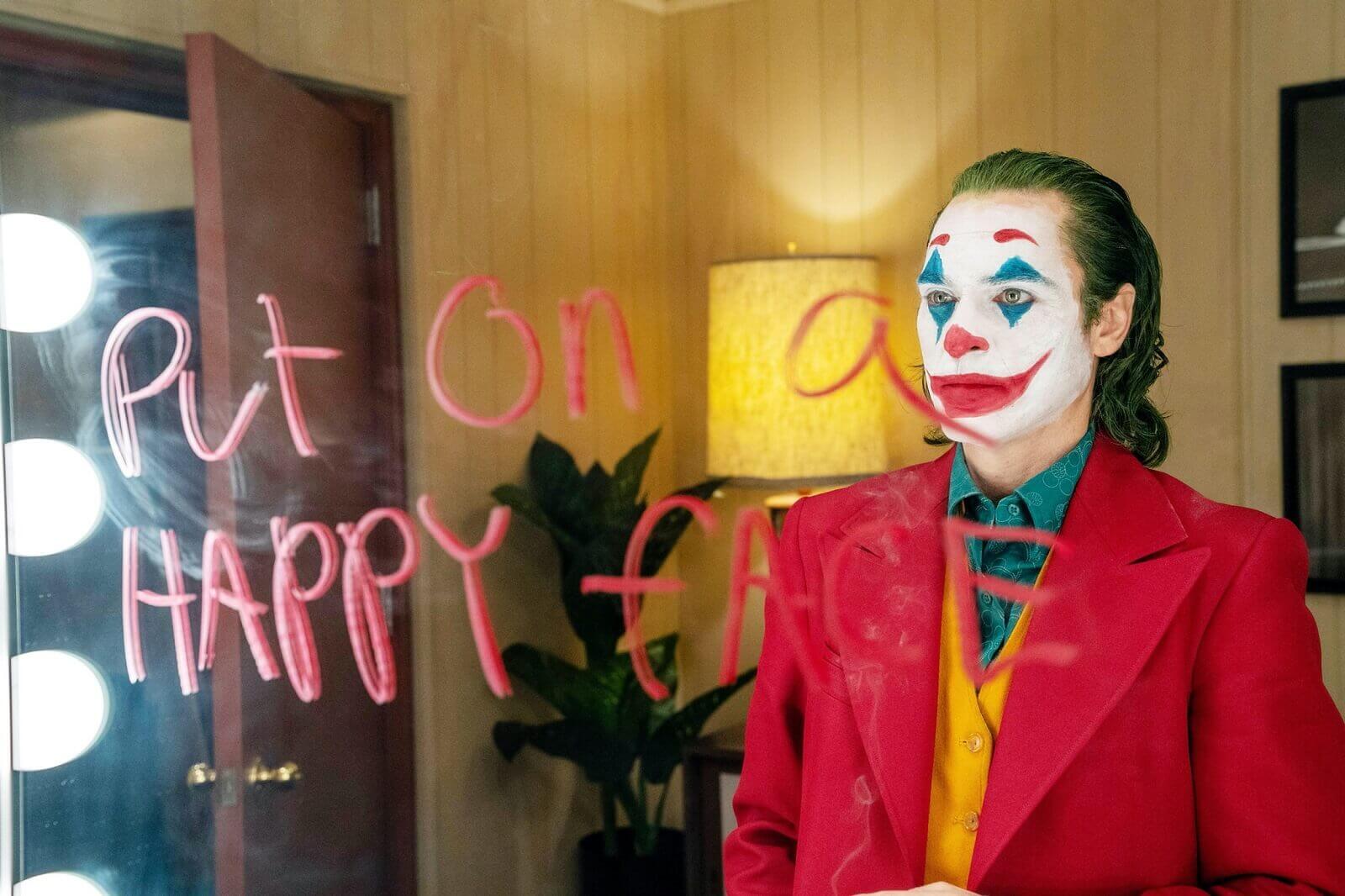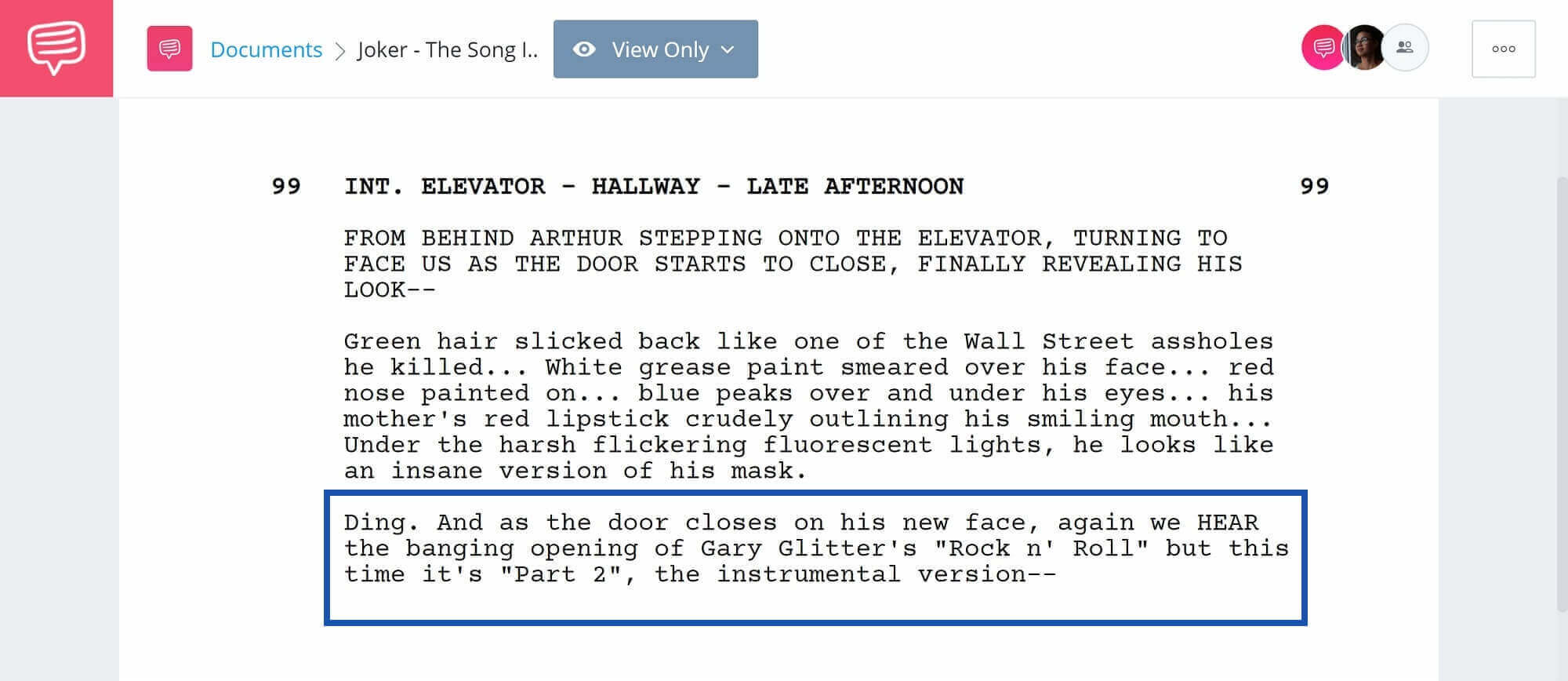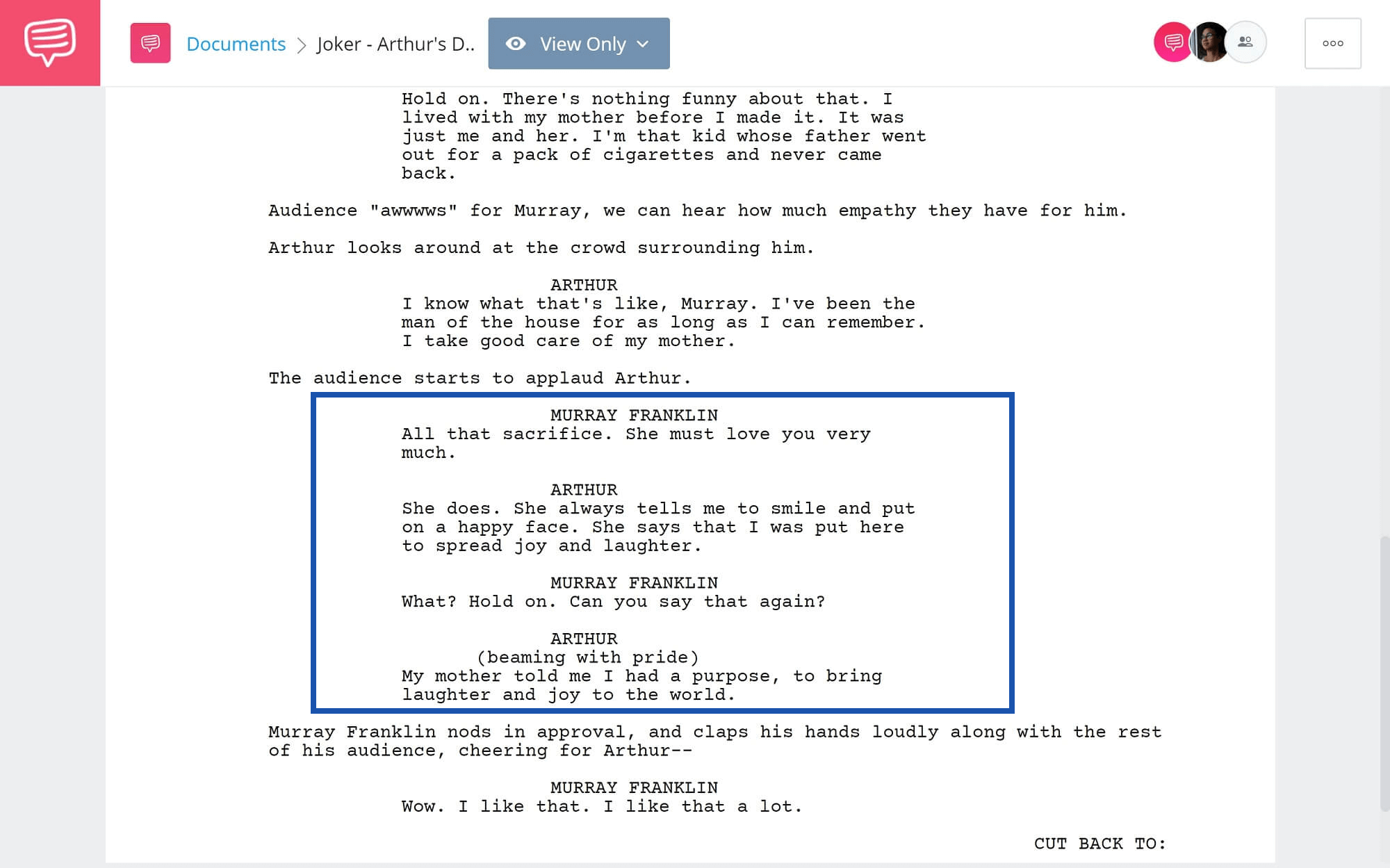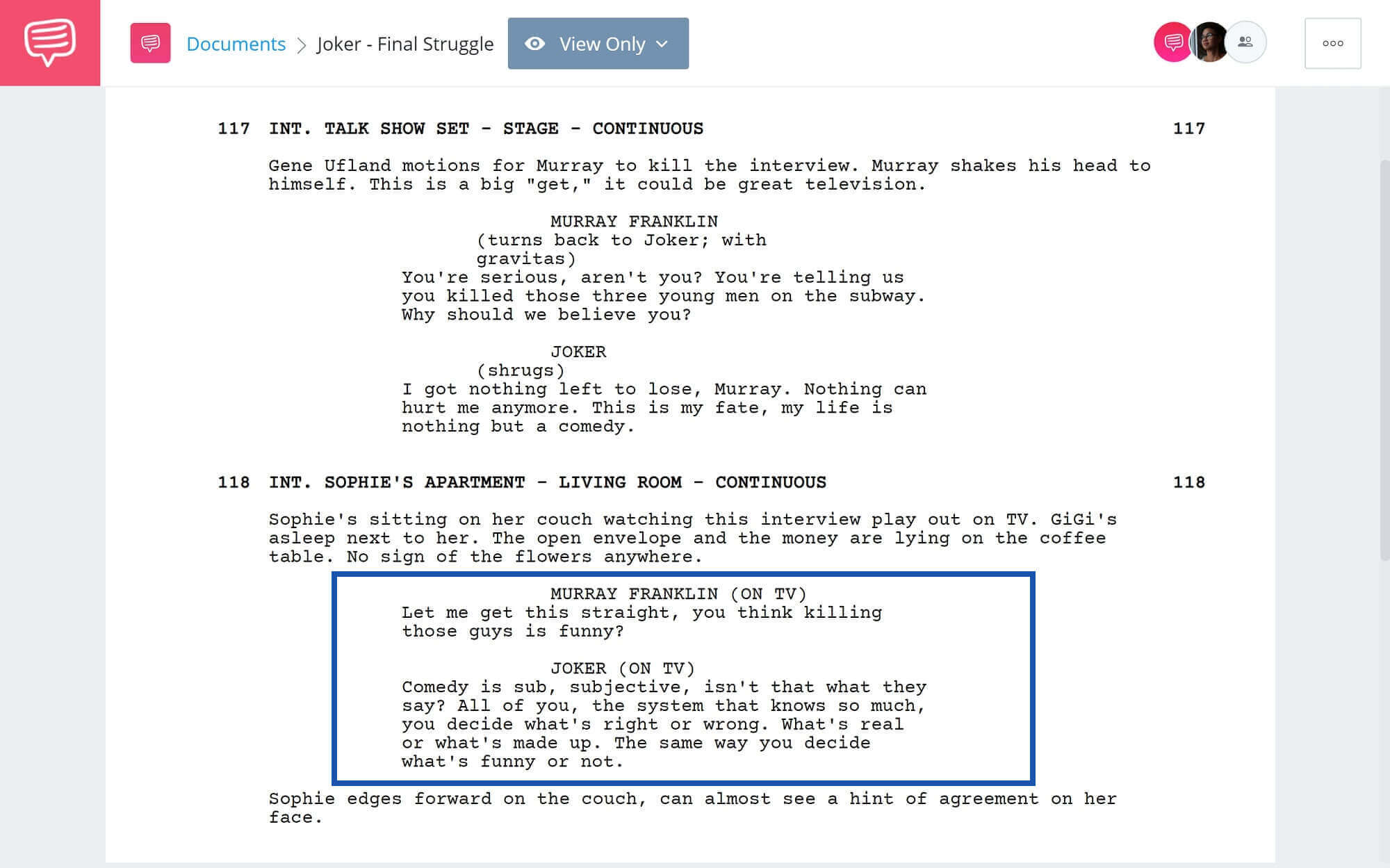Todd Phillips’ Joker (2019) sparked considerable controversy leading up to its release. Joker deals with many thematically disturbing elements — mental health, political violence, and an “incel”-like protagonist. Despite these concerns surrounding the Joker movie controversy, the movie did not inspire violence. Quite the opposite actually. So now, looking back, perhaps we can analyze the Joker movie controversy to see if there are any lessons for filmmakers. Taking a look at Phillips’ and Scott Silver’s script, what can we as screenwriters learn about creating pathos for the psychopaths in our stories?
The Joker Movie Controversy
Setting the stage
Before delving into this controversial film, let’s first summarize the plot of Joker (SPOILERS AHEAD).
Joker (2019) • Trailer
Set in Gotham City, Joker is a gritty character study of Arthur Fleck, a mentally-troubled comedian disregarded by society.
After being fired and pushed to the edge, Fleck shoots three Wall Street thugs harassing a woman on the subway. This sets in motion events which lead to the creation of his alter-ego: Joker. Making headlines, Joker becomes a symbol for the disenfranchised of Gotham City.
Fleck soon discovers a repressed past of abuse, neglect, and mental-illness. Throughout the film, Fleck asks if his life is a comedy or a tragedy. Now, he has his answer.
The climax nears as the late-night Franklin Murray Show invites Fleck on-air to exploit him. But, as the city wonders who killed those Wall Street thugs, Fleck appears on-air, fully transformed into the Joker and admits to the crime.
Undoubtedly, the most chilling scene in the film, Joker blames society for his devolution as he pulls his revolver and assassinates Murray in front of the live studio audience.
Joker’s fateful climax
From there, Joker takes his place as a symbol for political violence until an ambiguous “was it all a dream” epilogue. If you’re looking for even more in-depth analysis, check out our Joker movie review which rates the film’s entertainment value as well as filmmaking craft.
So, why is the Joker movie controversial in the first place?
The Response
Breaking down the Joker controversy
Evident from the synopsis, Joker deals with disturbing thematic content. After its premiere at the Venice Film Festival, Stephanie Zacharek, film critic at the Times, dismissed the film stating that Joker “lionizes and glamorizes Arthur even as it shakes its head, faux-sorrowfully, over his violent behavior.” Todd Phillips later responded to an onslaught of criticism leading up to the film’s release saying “if you’re seeing it as ‘glorifying’ him, you might be looking at it wrong.”
Todd Phillips addressing the Joker controversy
No matter what film critics editorialize, the Joker’s image undeniably weighs heavy in our popular culture. The 2012 mass shooting at a Dark Knight Rises screening in Aurora, Colorado re-contextualized the Joker, in a way that certainly played in people's minds as Phillips' film neared its release date.
Likewise, Ledger’s Joker has been misappropriated by alt-right trolls and "incels" online. More than anything, the Joker’s nihilism echoes that of hate groups in our own society, not unlike Gotham City’s.
Given this context, it’s clear why some panicked at the prospect of violence upon the film’s release. Truthfully, I avoided going the first weekend, too. Here's a news report about how theaters were preparing for opening weekend by banning costumes and make-up.
News coverage including a Joker movie warning
Multiple Joker movie warnings appeared leading up to the opening weekend. These included bulletins from the FBI and DoD to active service members. Likewise, the Joker violence anticipated inspired numerous think-pieces like Zacharek’s.
In hindsight, nothing did come from the Joker controversy. In fact, what followed was an overwhelmingly positive crowd reaction. The film garnered box office success the likes of which is rare for a character-driven drama nowadays. Then, the awards, coalescing with Joaquin Phoenix winning Best Actor at the 2020 Oscars.
Joaquin Phoenix addresses the Joker controversy
The Joker is not a new character but this is the first film to present him as a flesh-and-blood human and not some cartoonish anarchist. Every actor who has played the Joker brings a certain delicious villainy to the role but Phoenix's portrayal attempts to bring the humanity. Perhaps the Joker movie controversy around this version of the character seems to resonate because we can't just write him off.
Related Posts
JOKER CONTROVERSY SONG
What's the Joker song controversy?
The Joker movie controversy goes further than the feared violent reaction. The filmmakers were lambasted for their inclusion of “Rock and Roll (Part 2)” in the film’s soundtrack. The Joker song controversy stemmed from its artist, former glam rock star Gary Glitter.
Glitter, whose real name is Paul Gadd, is a convicted pedophile, serving 16 years in jail after being convicted for sexually abusing three young girls. After being found guilty of attempted rape, indecent assault and sexual intercourse with a girl under the age of 13, it’s easy to see why the inclusion of his song raised concerns.
Snapper Music, the UK record label that owns the rights to Glitter’s collection, confirmed that the singer would not make any money off the film. Glitter is not entitled to royalties or any other form of compensation.
However, the Joker song controversy has an added complexity. The song is prominently featured in the now-iconic scene of the Joker’s final transformation. Moreover, the song’s inclusion in the film is specifically called for in Silver and Phillip’s script, albeit the instrumental version.
Joker Transformation • Read Full Scene
While Gary Glitter is a lesser known glam rock star in the States, audiences in the U.K. were shocked to see its inclusion in Joker. Without a doubt, the song choice was controversial, especially after the dawn of #MeToo wherein activists have demanded accountability from Hollywood in such matters.
Online super-fan reactions are quick to defend the choice. “Weaponized Nerd Rage” makes clear his opinion in one of the myriad videos he produced defending Joker. The Joker song controversy is portrayed as a “non-troversy” perpetuated by the media. While Weaponized Nerd Rage states that he doesn’t defend Glitter’s actions, he makes his point clear: he “doesn’t care that they use that song.”
Joker is a controversial movie depending on who you ask, or what parts you focus on. The question is, to what extent is a filmmaker responsible for addressing these concerns? In the next section, we'll discuss how to craft an antihero.
Importance to Screenwriters
Creating your antihero
Before we go into how to craft your antihero, follow along as we review Todd Phillips’ and Scott Silver’s Oscar-nominated script.
Every screenwriting “guru” ever has uttered these five words: “Your character must be likable.” And, just as any blanket “rule” of screenwriting, it’s severely reductive and counter-productive to creating an interesting character we might want to follow.
As an audience, we want to see flawed characters. The promise of drama is that we’ll take a character from ignorance and illuminate a central theme through the process of change. Or, in a tragedy, an absence of change that brings about the character’s downfall. And if you’re incredulous about Aristotelian dramatic principles holding true today, check out this TedTalk breaking it down.
Why do we love tragedy?
As a screenwriter, writing an antihero has never been more daunting. Not only is there the albatross of the “likable” character, but a whole culture of sanctimonious outrage and "people-canceling."
As storytellers, we rise above the chatter to tell stories that may end up being controversial. But we have to do right by our characters, loathsome as some may be. So, let’s delve into how to create an effective antihero by looking at the Joker script.
Developing an Antihero
Establish the character's desire
Establishing a relatable desire for your antihero protagonist helps the audience identify. A desire for love, acceptance, purpose. Even if your antiheroes goal is to blow up the Empire State Building, his reasoning must be rooted in an emotional truth that resonates with the audience.
In an early scene, Arthur explains a bit of his backstory and his "purpose," as given to him by his mother.
Joker • Arthur's Purpose • Read Full Scene
Every protagonist, good or bad, has something they want. For Arthur Fleck, he’s always desired to make other people happy, “to bring laughter and joy to the world.” As an audience, we identify with his search for purpose and we begin to empathize.
Antihero Obstacles
Give them an antagonist
Joker is a movie about abuse perpetrated by society-at-large. However, it’s not easy to write a compelling film about systematic abuse without a clear antagonist. Arthur, as our protagonist, needs someone to fight. To do this, Phillips/Silver thoughtfully choose to personify societal failings in the form of specific characters Fleck can “battle.”
These antagonists include Thomas Wayne, Hoyt (Fleck’s boss), the Wall Street guys Fleck murders, and of course Murray Franklin.
These opposing forces battle our protagonist. Their battle is really a philosophical argument, or the film’s thematic argument.
Don't Forget About Theme
Present the thematic argument
An antihero story usually calls for the thematic argument to be flipped. The antagonist(s) in these films tends to represent the “right side” of the thematic argument while our antihero tragically believes the “wrong side.” The job of the screenwriter is to make these differing opinions battle it out.
However, point-of-view makes this tricky with an antihero. We’re asked to empathize with a character with which we fundamentally disagree. It’s what made Joker so risky in the first place. And it gets hairier and hairier as it nears the climax. Notice how this scene balance's Arthur's perspective between "right" and "wrong."
Joker • Final Struggle • Read Full Scene
In this scene, we feel the thematic elements tying up. As Joker becomes unhinged, the audience’s pity for him rises. What’s interesting is the fact that Phillips/Silver bring in Sophie’s perspective here. Sophie basically plays the role of audience surrogate as she witnesses Arthur spin out.
Writing your antihero is a balancing act. As the writer, you’re already keeping up with where your audience is on their emotional journey as well as your characters.
With an antihero, the stakes are raised. Your audience is looking for a reason to stop empathizing. Therefore, it’s imperative to give consideration to how your audience’s engaging with your antihero.
THE JOKER MOVIE CONTROVERSY
Conclusion
If anything, Joker taught us what careful consideration of an antihero/villain can do. While the themes and filmmaker choices may spark controversy, creating empathy for a character you disagree with is part and parcel of the job of a screenwriter.
Moreover, creating an antihero gives you liberty as an artist to discuss taboo subjects. And during divisive times, Joker teaches us that empathy is ultimately what saves the day.

Joker • Put on a Happy Face
UP NEXT
Ranking the best movie villains
We’ve discussed how the Joker movie controversy sprung. From that, we’ve deciphered what it means to create an “unlikable” antihero. And we’ve seen just how important it is to put care into crafting that antihero. But what about your classic villain? How do you effectively craft someone believable, not just a moustache-twirling evildoer? This blog ranks the top movie villains and what makes them tick. Hopefully this will help you create well-rounded characters in your next screenplay.



